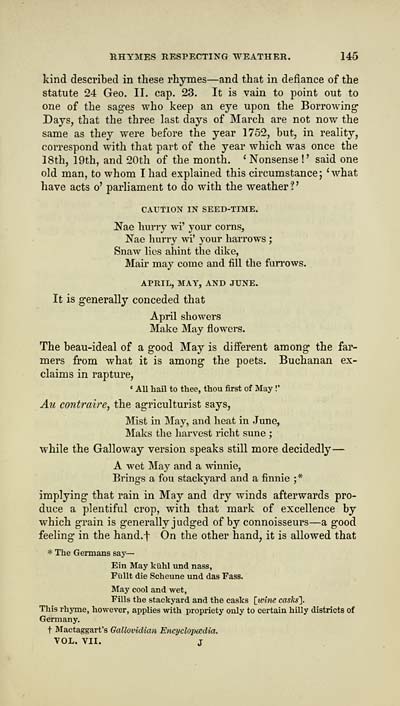Download files
Complete book:
Individual page:
Thumbnail gallery: Grid view | List view

RHYMES RESPECTING WEATHER. 145
kind described in these rhymes — and that in defiance of the
statute 24 Geo. II. cap. 23. It is vain to point out to
one of the sages who keep an eye upon the Borrowing-
Days, that the three last days of March are not now the
same as they were before the year 1752, but, in reality,
correspond with that part of the year which was once the
18th, 19th, and 20th of the month. ' Nonsense !' said one
old man, to whom I had explained this circumstance; 'what
have acts o' parliament to do with the weather ? '
CAUTION IN SEED-TIME.
Nae hurry wi' your corns,
Nae hurry wi' your harrows ;
Snaw lies ahint the dike,
Mair may come and fill the furrows.
APRIL, MAY, AND JUNE.
It is generally conceded that
April showers
Make May flowers.
The beau-ideal of a good May is different among the far-
mers from what it is among the poets. Buchanan ex-
claims in rapture,
« All hail to thee, thou first of May !'
Au contraire, the agriculturist says,
Mist in May, and heat in June,
Maks the harvest richt sune ;
while the Galloway version speaks still more decidedly —
A wet May and a winnie.
Brings a fou stackyard and a finnie ;*
implying that rain in May and dry winds afterwards pro-
duce a plentiful crop, with that mark of excellence by
which grain is generally judged of by connoisseurs — a good
feeling in the hand.f On the other hand, it is allowed that
* The Germans say—
Ein May ktihl und nass,
Fiillt die Scheune und das Pass.
May cool and wet,
Fills the stackyard and the casks [unne casks'].
This rhyme, however, applies with propriety only to certain hilly districts of
Germany,
t Mactaggart's Gallovidian Encyclopaedia.
VOL. VII. J
kind described in these rhymes — and that in defiance of the
statute 24 Geo. II. cap. 23. It is vain to point out to
one of the sages who keep an eye upon the Borrowing-
Days, that the three last days of March are not now the
same as they were before the year 1752, but, in reality,
correspond with that part of the year which was once the
18th, 19th, and 20th of the month. ' Nonsense !' said one
old man, to whom I had explained this circumstance; 'what
have acts o' parliament to do with the weather ? '
CAUTION IN SEED-TIME.
Nae hurry wi' your corns,
Nae hurry wi' your harrows ;
Snaw lies ahint the dike,
Mair may come and fill the furrows.
APRIL, MAY, AND JUNE.
It is generally conceded that
April showers
Make May flowers.
The beau-ideal of a good May is different among the far-
mers from what it is among the poets. Buchanan ex-
claims in rapture,
« All hail to thee, thou first of May !'
Au contraire, the agriculturist says,
Mist in May, and heat in June,
Maks the harvest richt sune ;
while the Galloway version speaks still more decidedly —
A wet May and a winnie.
Brings a fou stackyard and a finnie ;*
implying that rain in May and dry winds afterwards pro-
duce a plentiful crop, with that mark of excellence by
which grain is generally judged of by connoisseurs — a good
feeling in the hand.f On the other hand, it is allowed that
* The Germans say—
Ein May ktihl und nass,
Fiillt die Scheune und das Pass.
May cool and wet,
Fills the stackyard and the casks [unne casks'].
This rhyme, however, applies with propriety only to certain hilly districts of
Germany,
t Mactaggart's Gallovidian Encyclopaedia.
VOL. VII. J
Set display mode to: Large image | Transcription
Images and transcriptions on this page, including medium image downloads, may be used under the Creative Commons Attribution 4.0 International Licence unless otherwise stated. ![]()
| Early Gaelic Book Collections > J. F. Campbell Collection > Popular rhymes of Scotland > (153) |
|---|
| Permanent URL | https://digital.nls.uk/81376430 |
|---|
| Description | Volumes from a collection of 610 books rich in Highland folklore, Ossianic literature and other Celtic subjects. Many of the books annotated by John Francis Campbell of Islay, who assembled the collection. |
|---|
| Description | Selected items from five 'Special and Named Printed Collections'. Includes books in Gaelic and other Celtic languages, works about the Gaels, their languages, literature, culture and history. |
|---|

